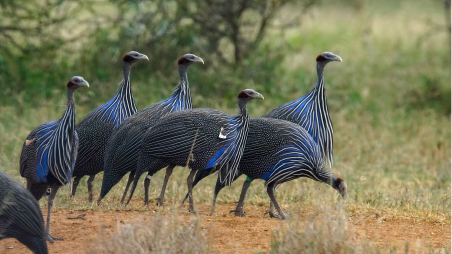E&E Seminar: Physiological costs of movement in a highly-social terrestrial bird, the Vulturine guineafowl
Movement is a fundamental part of life for most animals, allowing them to access food or mates and facilitating escape from predators.
Speakers
Event series
Content navigation
Description

Movement is a fundamental part of life for most animals, allowing them to access food or mates and facilitating escape from predators. However, these benefits are just as often balanced against substantial energetic costs and environmental limitations. In some cases, individuals can exhibit specific strategies to overcome these challenges—for example, by opting to move through more easily traversable habitats or by investing in more-efficient modes of movement when travelling over large distances.
In social and group-living animals, individuals not only have to solve the same problems as solitary individuals, they also have to overcome the challenges of coordinating their actions to remain cohesive with the rest of the group. When disagreements arise within a group (e.g. over preferred resources, movement directions, or in terms of differing physical capabilities), some members can be forced to compromise on their own optimal strategies in order to maintain cohesion. In this talk, I’ll discuss some of my work on Vulturine guineafowl, looking at the strategies individuals can use to manage the physiological costs of movement, how these strategies are shaped by the physical and social environment, and some of the unexpected costs and trade-offs that have shaped the evolution and expression of collective behaviours.
Location
Please note: this seminar will be held in the Eucalyptus Rm and via Zoom, details are included below.
Please click the link below to join the webinar:
https://anu.zoom.us/j/87689998032?pwd=oVDpfL5U1slNb781MqhQP3cCrig9r4.1
Passcode: 766333
Canberra time: please check your local time & date if you are watching from elsewhere.


